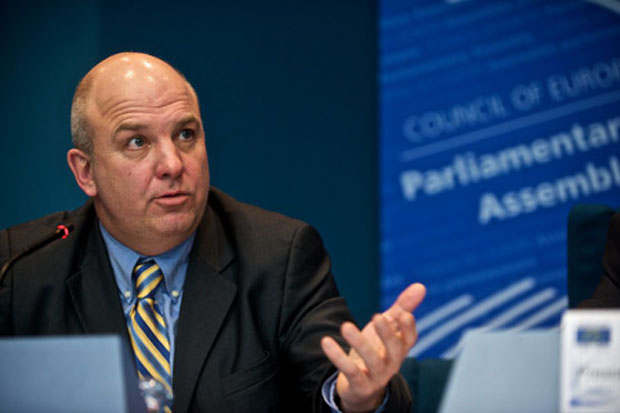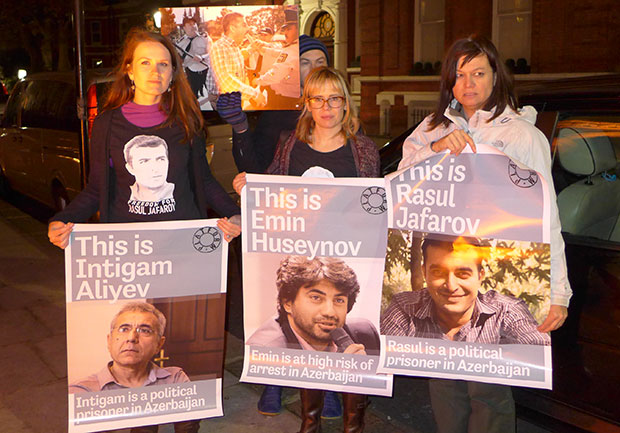23 Dec 2014 | Azerbaijan Statements, News and features, Statements

Azerbaijan’s government continues to repress civil society activists, human rights defenders and journalists. Many of them are now behind bars on trumped up charges, but in fact they were arrested for their human rights activities.
Index on Censorship and the Civic Solidarity Platform invite you to express your solidarity with our colleagues in Azerbaijan, who won’t be able to celebrate New Year’s Eve with their relatives and friends. Send them a postcard with words of support.
Here are addresses of our colleagues who are in detention:
Rasul Jafarov (Rəsul Cəfərov), Baki İstintaq Tecridxanasi, Kürdaxani qesebesi, Baku AZ1000, Azerbaijan
Intigam Aliyev (İntiqam Əliyev), Baki İstintaq Tecridxanasi, Kürdaxani qesebesi, Baku AZ1000, Azerbaijan
Leyla Yunus, Baki İstintaq Tecridxanasi, Kürdaxani qesebesi, Baku AZ1000, Azerbaijan
Anar Mammadli (Anar Məmmədli), Baki İstintaq Tecridxanasi, Kürdaxani qesebesi, Baku AZ1000, Azerbaijan
Bashir Suleymanli (Bəşir Süleymanlı), Baki İstintaq Tecridxanasi, Kürdaxani qesebesi, Baku AZ1000, Azerbaijan
Khadija Ismayilova (Xədicə İsmayıl), Baki İstintaq Tecridxanasi, Kürdaxani qesebesi, Baku AZ1000, Azerbaijan
Arif Yunusov, MTN Intintaq Tecridxanasi, Parlament Prospekti, 14, Baku AZ1006, Azerbaijan
REFERENCE
Leyla Yunus (was arrested in the 30 of July) – director of the Azerbaijan Institute of Peace and Democracy. Merit in advocacy Leyla Yunus awarded the prize “Knight of the Legion of Honor of France,” she is also the winner of the International Prize Theodore Hecker. She is accused of 217 (parricide), 178 (fraud), 192 (illegal business) and 213 (tax evasion) of the Criminal Code. She detained for three months. Analysis of the situation in a statement.
Rasul Jafarov (was arrested in the 2 of August) – one of the initiators and coordinators of the campaign “Sing for Democracy” and “The Art of Democracy”, advocated for the rights of political prisoners, actively participated in the International Platform “Civil Solidarity.” He is accused of: tax evasion (Article 192), illegal business (Article 213) and malpractice (Article 308). Statement by the Civil Solidarity Platform
Arif Yunus (was arrested in the 6 of August) – Head of the Department of Conflict and Migration Institute of Peace and Democracy in Azerbaijan, Ph.D., a conflictologist, a historian. Were initiated the criminal case concerning him under the next article 274 (parricide) и 178 (fraud). More about his arrest
Anar Mammadli and Bashir Suleymanli (arrested on 16 December 2013, sentenced to 5.5 and 3.5 years respectively in May 2014) are prominent human rights activists and founders of the Election Monitoring and Democracy Studies Centre. Arrested and jailed, following outspoken criticism of presidential elections in October 2013, in spite of international protests. On 29 September 2014, Mammadli was awarded the Václav Havel Award for Human Rights by the Council of Europe. Analysis of the situation in a statement.
Intigam Aliyev (arrested on 8 August) is a human rights defender and a lawyer specialized in defending rights of citizens in the European Court of Human Rights. He is charged with Articles 213.1 (tax evasion), 308.2 (malpractice) и 192.2 (illegal business) of the Criminal Code.
Khadija Ismayilova (arrested on 5 December) is an investigative journalist and radio host who is currently working for the Azerbaijani service of Radio Free Europe/Radio Liberty. She is a member of the Organized Crime and Corruption Reporting Project. She was arrested under charges of incitement to suicide, a charge widely criticized by human rights organizations. Analysis of the situation in a statement.
5 Dec 2014 | Azerbaijan, Azerbaijan News, News and features

Khadija Ismayilova
The arrest of Azerbaijani investigative journalist Khadija Ismayilova today underscores the entrenched authoritarian instincts of the government of President Ilham Aliyev. Ismayilova was sentenced to a two month pretrial detention.
“The arrest of Khadija Ismayilova is part of Azerbaijan’s continued crackdown on free media and civil society. This confirms the pattern of intimidation and harassment perpetrated by authorities in an attempt to silence critical voices,” Melody Patry, senior advocacy officer at Index on Censorship, said.
Ismayilova’s arrest follows the earlier detentions of human rights defenders Leyla Yunus and her husband Arif Yunus; free speech advocate Rasul Jafarov; journalists Seymur Hezi, Parviz Hashimli, Nijat Aliyev and Sardar Alibeyli; and bloggers Omar Mamedov, Abdul Abilov and Rashad Ramazano. The country has starved the 2014 Index award winning Azadliq newspaper of resources, forcing it to suspend its print edition. The charges against all of the detainees range from hooliganism to illegal storage and sale of drugs.
Today’s action by Azerbaijan’s authorities also drew immediate criticism from Human Rights House Foundation Executive Director Maria Dahle and the OSCE Representative on Freedom of the Media Dunja Mijatović.
“This sentence does not come as a surprise: we assumed the authorities wanted to silence Khadija Ismayilova,” said Dahle. “The arrest has a chilling effect: one must now consider that every independent civil society leader in Azerbaijan is a target and can be arrested at any given time for any charge, as ludicrous as one can imagine. The international community, especially the Council of Europe, must now get a foot in the door to stop the repression, including by stopping further cooperation with Azerbaijan’s authorities”, Dahle added.
“The arrest of Ismayilova is nothing but orchestrated intimidation, which is a part of the ongoing campaign aimed at silencing her free and critical voice,” Mijatović said.
On Friday afternoon, Ismayilova’s usually very active Facebook page was also inaccessible.

Azerbaijan, which spends significant amounts on media relations, presents itself as a modern nation. But behind the smokescreen, the country has been carrying out a systematic suppression of civil society, journalists and independent media.
This article was posted on 5 Dec 2014 at indexoncensorship.org
24 Nov 2014 | Azerbaijan, Azerbaijan News, Azerbaijan Statements, Europe and Central Asia, News and features

Council of Europe Commissioner for Human Rights Nils Muižnieks (Photo: Council of Europe)
I recently returned from one of the most difficult missions of my two-and-a-half year tenure as Council of Europe Commissioner for Human Rights. In late October I was in Azerbaijan, the oil-rich country in the South Caucasus, which just finished holding the rotating chairmanship of the 47-member Council of Europe. Most countries chairing the organisation, which prides itself as the continent’s guardian of human rights, democracy and the rule of law, use their time at the helm to tout their democratic credentials. Azerbaijan will go down in history as the country that carried out an unprecedented crackdown on human rights defenders during its chairmanship.
All of my partners in Azerbaijan are in jail. It was heart-wrenching to visit Leyla Yunus in pre-trial detention outside of Baku, Azerbaijan’s capital. Head of the Institute for Peace and Democracy, Leyla is Azerbaijan’s most prominent human rights activist and one of three finalists for this year’s prestigious Sakharov award, granted by the European Parliament. I do not know whether it was due to her cataracts or her emotional distress, but she cried throughout our half-hour meeting. The 58-year-old also has diabetes, Hepatitis C and kidney problems. She was in particular anguish for not having had the chance to see Arif, her husband of 26 years, for more than three months. He is also in pre-trial detention, despite having had a stroke just prior to his arrest.
The Yunus couple are among the brave activists in the region that have sought to promote dialogue with their counterparts in Armenia, a country with which Azerbaijan has been at war for the last 25 years over the Nagorno-Karabakh region, which was violently wrested from Azerbaijan as the Soviet Union collapsed. Arif and Leyla Yunus have both been charged with the crime of treason. Leyla regularly compiled lists of the country’s political prisoners for submission to international organisations. On October 24, the day I left Azerbaijan, a Baku court prolonged Leyla’s pre-trial detention for another four months.
Another difficult meeting was with Intigam Aliyev, one of Azerbaijan’s most renowned human rights lawyers, who is also in pre-trial detention for allegedly violating the restrictive provisions that make human rights work virtually impossible in the country. Until his arrest three months ago, Intigam was the co-ordinator of the Council of Europe’s legal training programme in the country. He was also legal counsel for dozens of cases against Azerbaijan before the European Court of Human Rights. When the authorities seized all of his documents, including the case files, he said he felt like the rug had been pulled from under his feet. He did not know how he could continue pushing the cases at the European Court or how he could defend himself. Again, the day I left Azerbaijan, his pre-trial detention was prolonged for another three months. When the judge announced his decision, Intigam nearly fainted.
I had a more upbeat meeting with Anar Mammadli, winner of this year’s Vaclav Havel prize, granted by the Parliamentary Assembly of the Council of Europe. Anar has already been convicted to a five-and-a-half-year prison sentence for violating the country’s cumbersome NGO laws (the formal charges were tax evasion, illegal entrepreneurship and abuse of authority). Anar was appealing his conviction and was in good spirits, despite the scant chances of success of his appeal. As one of the country’s most professional organisers of election monitoring, Anar had been harshly critical of several previous ballots in the country. Anar spends most of his time exercising and reading books on political science, philosophy and history. He wanted to know how from prison he could provide input to the Council of Europe’s efforts to assist Azerbaijan improve the legal framework for NGOs.
I also left heartened by a meeting with Rasul Jafarov, the head of an NGO called the Human Rights Club. Though he had had his pre-trial detention extended for another three months the day before I met him, Rasul was in good spirits. Rasul made a name for himself by organising a campaign called “Sing for Democracy” in the run-up to the holding of the Eurovision Song contest, which Azerbaijan hosted in 2012. He had planned to organise a new campaign called “Sports for Democracy” in the run-up to the holding of the European Games in Azerbaijan in 2015. Though he is charged with violations of the NGO law, as we bid farewell to each other, he related his plans to organise a human rights NGO among detainees.
While most of my partners are in detention, others discontinued their human rights work, left the country over the summer, or went into hiding as the crackdown spread. I visited one of the activists in hiding, Emin Huseynov, head of the Institute for Reporters’ Freedom and Safety, an NGO defending journalists in Azerbaijan’s restrictive media context. Though Emin is only 35 years old, he has very high blood pressure and an old spinal injury caused by an encounter with Azerbaijani police batons at an “unauthorised” demonstration a few years ago. Doctors who have examined him say he will not survive an Azerbaijani prison.
These are just some of the activists and journalists languishing in prison or under pressure in Azerbaijan. They are core partners for the Council of Europe – they have all attended roundtables for human rights defenders organised by my office or participated in events organised by the Parliamentary Assembly. The Council of Europe’s primary friends and partners in the country have almost all been targeted. While this pains me deeply, it also makes practical cooperation between Azerbaijan and the Council of Europe extremely difficult. The reprisals must stop. Now.
This article was originally posted on the Facebook page of the Council of Europe Commissioner for Human Rights. It is republished here with permission from the Council of Europe and the Council of Europe Office of the Commissioner for Human Rights.
18 Nov 2014 | Azerbaijan, Azerbaijan News, News and features

(Photo: Index on Censorship
Organisations and individuals from across Europe gathered in front of Azerbaijani embassies on Monday to call for the release of political prisoners and demand Azerbaijan ends its crackdown on civil society.
Index on Censorship, joined by Platform London among others, held a demonstration outside the embassy of Azerbaijan, lighting near 100 candles, one for each political prisoner currently jailed on trumped up charges.
Azerbaijan’s National Revival Day is on 17 November. On this day in 1988, people started demonstrating in Azadliq (Freedom) Square, and the protest grew into a national movement that led to the declaration of national independence from the Soviet Union. Today, 26 years later, the people of Azerbaijan cannot even gather in Freedom Square to ask for the release of political prisoners. Freedom of expression and assembly are repressed, and those who dare speaking up face heavy consequences.

Protesters held a vigil in front of the Azerbaijan embassy in London to call for the release for political prisoners in the country. (Photo: Index on Censorship)
In the past six months, as Azerbaijan chaired the Council of Europe’s Committee of Ministers, authorities unleashed an unprecedented crackdown on civil society, including the imprisonment of human rights defenders and political activists. Others have been forced into hiding.
Those imprisoned during Azerbaijan’s chairmanship (14 May – 13 November 2014) include:
- Anar Mammadli, election monitor and this year’s Václav Havel Human Rights Prize recipient
- Leyla Yunus, justice advocate who was awarded the French Legion of Honour in 2013, and her husband Arif Yunus,
- Rasul Jafarov, campaigner who has criticised Azerbaijan at the Council of Europe and, together with Leyla Yunus, compiled a list of political prisoners in Azerbaijan,
- Intigam Aliyev, human rights lawyer who has criticised Azerbaijan at the Council of Europe.
As the situation continues to deteriorate, Azerbaijan is getting ready to host the first European Olympics in summer 2015, an event designed to whitewash the repressive regime’s record.
Platform London will be holding other demonstrations at 5pm everyday this week.
- Tuesday 18 November BP’s HQ – 1 St James’ Sq – 5pm
- Wednesday 19 November – Uk Foreign and Commonwealth Office on King Charles Street – 5pm
- Thursday 20 November – the European Bank for Reconstruction and Development, 1 Exchange Square (by Liverpool st) – 5pm
- Friday 21 November – the International Olympic Committee – 60 Charlotte Street






